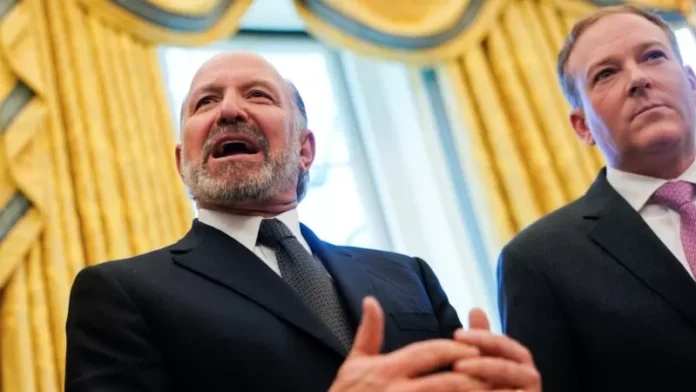Washington – In a crucial and highly anticipated move, the Senate has confirmed Howard Lutnick, a wealthy financier, as the new commerce secretary. President Donald Trump’s nominee will now take on the responsibility of overseeing 50,000 employees at the Commerce Department. Lutnick, who previously served as CEO at the investment firm Cantor Fitzgerald, is expected to be a staunch supporter of the president’s hardline trade policies.
The Senate vote to confirm Lutnick was a close one, with a final count of 51-45 in his favor. He now joins the ranks of top officials in the Trump administration who are dedicated to implementing the president’s vision for the country’s economic policies. As commerce secretary, Lutnick will have a wide range of duties, from collecting economic statistics and running the census to issuing weather reports. However, his primary focus will be on managing the president’s aggressive plans to impose import taxes on U.S. trading partners, including both allies and adversaries.
One of the key tasks for Lutnick, along with Jamieson Greer, Trump’s nominee for the top U.S. trade negotiator, will be to navigate the president’s trade policies which have been a topic of intense debate and criticism. Trump sees tariffs as a versatile economic tool that can serve multiple purposes. They can generate revenue to finance his tax cuts, protect U.S. industries and exert pressure on other countries to make concessions on issues such as trade barriers, immigration, and drug trafficking. However, many mainstream economists view tariffs as counterproductive, as they end up being paid by import companies in the United States. These companies then try to pass on the added costs to consumers, which can lead to inflationary pressures in the overall economy.
During his confirmation hearing last month, Lutnick dismissed the idea that tariffs contribute to inflation as “nonsense”. He expressed his support for implementing tariffs on a country-by-country basis to “strong-arm” other nations into lowering their barriers to American exports. This aligns with Trump’s “America First” ideology, which seeks to protect American industries and workers from what he perceives as unfair trade practices by other countries.
In a bold move last week, Trump announced plans for “reciprocal” tariffs, which would raise U.S. import tax rates to match the higher taxes imposed by other countries on goods from the U.S. This would disrupt the longstanding rules that have governed world trade for decades, which have mostly been negotiated between multiple countries. Trump, on the other hand, is taking a more direct approach and is taking charge of the process himself.
In addition to these developments, the president has also imposed a 10% tariff on Chinese imports and increased U.S. taxes on foreign steel and aluminum. He has also threatened to impose a 25% tariff on goods from Canada and Mexico, which has been delayed till March 4th. These measures have sparked concern among trade experts and business leaders, who fear that they could lead to a trade war and have a negative impact on the economy.
Lutnick’s experience as CEO at Cantor Fitzgerald during the September 11, 2001, terrorist attacks is one of the key factors that influenced Trump’s decision to choose him for the position of commerce secretary. That fateful day, Cantor Fitzgerald lost 658 of its employees, including Lutnick’s brother. He showed tremendous leadership in leading the firm’s recovery and is a member of the Board of Directors of the National September 11 Memorial & Museum.
As the new commerce secretary, Lutnick has pledged to sell off his business holdings, which are rather complex. His financial disclosure statement revealed that he had positions in over 800 private businesses and organizations. This step further underscores his commitment to fulfilling his duties with utmost integrity and without any conflicts of interest.
In conclusion, Howard Lutnick’s confirmation as commerce secretary marks a significant milestone for the Trump administration and its efforts to reshape the country’s economic policies. His background as a successful financier and his experience in leading a company through a major crisis will prove valuable in his new role. With the support of the Senate and President Trump, we can expect him to carry out his responsibilities with dedication and a strong resolve to fulfill the president’s vision for a prosperous America.

